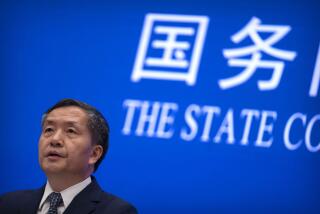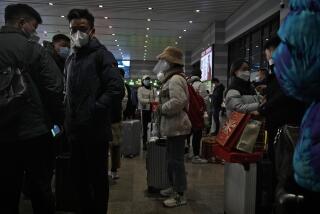Hong Kong Faulted for SARS Response
- Share via
SHANGHAI — The Hong Kong government’s initial response to the SARS outbreak this year was seriously flawed, a panel of international experts said Thursday, but the group stopped short of blaming any health official in particular, and the territory’s health commissioner vowed to stay on the job.
The report faulted poor communication among government agencies and private hospitals and a lack of timely warnings to the public.
“We need to learn from this costly experience so we can react a lot better the next time,” Health Secretary Yeoh Eng-kiong said at a news conference in Hong Kong, at which he apologized to families of the nearly 300 people in the Chinese territory who died of severe acute respiratory syndrome.
Yeoh, who has been under pressure for months from some families and other critics to resign, said he had seriously considered doing so. But, he said, he concluded that his agency had developed strong guidelines for dealing with a possible return of SARS this winter and that “it would be better if I stay.”
The SARS virus is believed to have been carried from the southern Chinese mainland to Hong Kong in late January or February, and it ultimately infected about 1,750 people in the territory. Aside from mainland China, it also struck hard in Singapore and Canada. Altogether, about 8,500 people were infected and at least 800 died.
In Hong Kong, officials’ response to the epidemic was one of several issues that prompted large-scale protests this summer, posing a threat to the government, which is backed by leaders in Beijing. Many of the protesters said the Hong Kong government’s response was too slow and that health agencies initially downplayed the threat.
The panel, convened by the government to examine all aspects of the response, said in a summary of its report: “There is no doubt in our view that there were system failures in the response to the epidemic, particularly in the early phase.... Lessons must be learned.”
But the 11 members of the panel said they had “not found any individual deemed to be culpable of negligence, lack of diligence or maladministration.”
One of the panel’s co-chairmen, professor Sian Griffiths, president of the faculty of public health medicine at the Royal Colleges of Physicians in Britain, said at the news conference that there were “significant shortcomings” in the early response, “some of which were aggravated by key personnel becoming ill with SARS.”
But the report also appeared to blame officials on the mainland for failing to provide more information.
“The committee notes that accurate information about the atypical pneumonia outbreak in Guangdong province was not available to Hong Kong or the international community at the time,” the report says, “otherwise, the epidemic in Hong Kong might have been ameliorated.”
The panel, which included experts from Hong Kong, China, Britain, the United States and Australia, made 46 recommendations on dealing with the threat of future outbreaks. These included establishing a rapid-response program in nearly every neighborhood and launching an expanded education program for health workers and the public.
Hong Kong’s chief executive, Tung Chee-hwa, who is appointed and backed by the Beijing government, acknowledged the criticisms Thursday in accepting the panel’s report, but he defended the health secretary, saying Yeoh was “well equipped to take us forward” in dealing with the disease.
“The most important thing is to make sure SARS will not return,” Tung told reporters. “We must be ready.”
Hong Kong’s airlines and numerous tourist-driven businesses such as restaurants, hotels and shops suffered a devastating setback, especially after the World Health Organization issued an advisory in early April against travel to the territory. It was lifted May 23 and the economy has rebounded somewhat, though many businesses offered steep discounts.
The panel’s report, though extensive, may not satisfy public demands for a full explanation of how the crisis unfolded. Some Hong Kong lawmakers have suggested that they would push for an independent inquiry, and at least a dozen families of victims are pursuing plans for a lawsuit against the government.
“So many people died, and it’s ridiculous that no one is to blame,” Tim Pang, a spokesman for the nonprofit Patients’ Rights Assn., said Thursday. “The report said these government agencies did not communicate properly with each other, but can nobody be blamed?”
Reuters was used in compiling this report.
More to Read
Sign up for Essential California
The most important California stories and recommendations in your inbox every morning.
You may occasionally receive promotional content from the Los Angeles Times.













